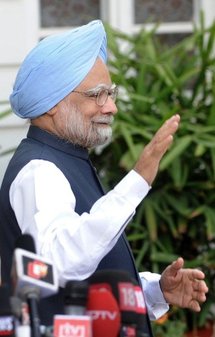Indian premier in groundbreaking Saudi visit
Paul Handley
RIYADH, Paul Handley - Manmohan Singh arrived in Saudi Arabia on Saturday for the first visit by an Indian premier to the oil kingpin in 28 years with energy imports, Middle East peace and Islamic militancy on the agenda.
The Indian prime minister was greeted by Crown Prince Sultan bin Abdul Aziz, the official Saudi Press Agency said.

Manmohan Singh
"India and Saudi Arabia belong to the same extended neighbourhood," he told the Saudi Gazette.
"During my visit I propose to discuss with King Abdullah how we can promote greater stability and security in the region," he said.
"Both King Abdullah and I reject the notion that any cause justifies wanton violence against innocent people.
"We are strong allies against the scourge of extremism and terrorism that affects global peace and security."
The visit, the first by an Indian premier since Indira Gandhi came in 1982, underscores both sides' desire to improve ties.
King Abdullah broke the ice underpinned by Riyadh's long deep ties with Indian rival Pakistan with a visit to New Delhi in January 2006, just five months into his reign.
Together with a trip to China, it represented the oil giant's turn eastward toward Asia's economic dynamism from its former Western orientation.
On the first full day of the visit Sunday, Singh plans to address the Riyadh Chamber of Commerce and the advisory Shoura Council.
His is also expected to meet King Abdullah.
The deaths of at least nine Indians among 16 people killed in a militant attack in the Afghan capital Kabul on Friday highlighted the visit's focus on security issues.
The two sides are concerned about Al-Qaeda and other radical Islamic groups with footholds in Pakistan and Afghanistan, where Saudi Arabia wields influence.
Afghanistan President Hamid Karzai telephoned the Indian premier to offer his condolences earlier Saturday. Singh conveyed India's "outrage" at the strike, a statement from the Indian leader's office said.
Iran's nuclear drive is also a joint concern for India and Saudi Arabia, though more nuanced for India which has its own nuclear arsenal.
"Our view is that Iran is a signatory to the NPT (nuclear Non-Proliferation Treaty); it is entitled to all the rights that go with its membership of the NPT; and it must also observe all the obligations that go as part of the membership of the NPT," said Singh.
The United States has accused Iran of violating its NPT obligations by seeking to develop nuclear weapons, which Iran denies.
Singh arrived assuring that despite India's buying significant arms from Israel, his government's support for an independent Palestinian state with its capital in east Jerusalem "is an article of faith for us."
The Indian leader was travelling with a large contingent of businessmen, underscoring another theme of the visit, seeking to boost bilateral trade and investment.
Two-way trade reached 25 billion dollars last year, weighted heavily in Riyadh's favour due to oil sales to India.
Saudi Arabia is India's biggest crude supplier, accounting for 20 percent of the country's total consumption, according to the Federation of Indian Chambers of Commerce and Industry, or FICCI.
India mainly exports spices to Saudi Arabia, according to a report Saturday by Banque Saudi-Fransi.
But ahead of his departure for Riyadh, Singh said there was "great scope for opening new frontiers of cooperation" in such areas as security, defence, science and technology.
There are also an estimated 1.6 million Indians working in Saudi Arabia, the largest contingent of the estimated 10 million foreign workers in the country.
Mostly low-skilled workers, they remit several billion dollars back home each year, an important source of foreign exchange for India.
The two governments are due to sign nine agreements on expanding cooperation in the hydro-carbon sector, an extradition treaty and agreements on science and technology during the visit.
----------------------------------------------------------------------------